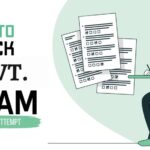Achieving academic success is a goal for many students, but knowing how to study effectively can be a challenge. With countless techniques and tips available, it’s essential to find what works best for you. In this article, we’ll explore seven study strategies designed to enhance your academic performance. These methods are not only practical but also supported by educational research, ensuring you make the most of your study time.
Understand Your Learning Style
Visual Learners
Visual learners benefit from using images, charts, and graphs to understand information. Incorporating visual aids into your study sessions can significantly enhance comprehension and retention.
Auditory Learners
Auditory learners grasp concepts better when they hear them. Listening to lectures, engaging in discussions, or using audiobooks and recordings can be particularly effective.
Kinesthetic Learners
Kinesthetic learners learn best through hands-on activities. Engaging in experiments, building models, or practicing physical tasks can aid in understanding complex concepts.
Create a Study Schedule
Setting Realistic Goals
Establish clear, achievable goals for each study session. Breaking down larger tasks into smaller, manageable ones can prevent feeling overwhelmed and keep you motivated.
Consistency is Key
Study at the same time each day to build a routine. Consistency helps reinforce learning and makes studying a regular part of your day.
Balancing Study and Breaks
Incorporate regular breaks to avoid burnout. Techniques like the Pomodoro Technique, which involves studying for 25 minutes followed by a 5-minute break, can improve focus and productivity.
Active Learning Techniques
Summarization
Summarize the material in your own words to reinforce understanding and retention. Writing summaries helps solidify the information in your memory.
Questioning
Ask yourself questions about the material and try to answer them. This technique encourages critical thinking and deeper comprehension.
Teaching Others
Explain the material to someone else. Teaching forces you to understand the content thoroughly and identify any gaps in your knowledge.
Utilize Technology
Educational Apps
Apps like Quizlet, Anki, and Khan Academy offer interactive learning experiences and can supplement traditional study methods.
Online Resources
Websites such as Coursera, edX, and YouTube provide access to lectures, tutorials, and additional learning materials on various subjects.
Digital Note-Taking
Using tools like Evernote or OneNote allows for organized, searchable notes that you can access anytime, anywhere.
Practice Retrieval
Self-Testing
Regularly quiz yourself on the material. Self-testing is a powerful tool for reinforcing memory and identifying areas that need more attention.
Flashcards
Use flashcards to test your recall on key concepts, terms, and definitions. Apps like Anki can automate this process with spaced repetition algorithms.
Past Papers
Practice with past exam papers to familiarize yourself with the format and types of questions you may encounter.
Stay Organized
Designate a Study Space
Create a dedicated study area free from distractions. A clean, organized space can help you stay focused and productive.
Use Planners and Calendars
Keep track of assignments, tests, and deadlines with a planner or digital calendar. This ensures you manage your time effectively and stay on top of your workload.
Organize Study Materials
Keep your notes, textbooks, and resources organized. Use folders, binders, or digital tools to categorize and easily retrieve information when needed.
Healthy Lifestyle Choices
Nutrition
Eat a balanced diet rich in fruits, vegetables, and whole grains. Proper nutrition fuels your brain and enhances cognitive function.
Exercise
Incorporate regular physical activity into your routine. Exercise improves blood flow to the brain, enhancing memory and concentration.
Sleep
Prioritize sleep to ensure your brain can consolidate information and function optimally. Aim for 7-9 hours of quality sleep each night.
Motivation and Mindset
Positive Thinking
Maintain a positive attitude towards your studies. Believe in your ability to succeed and stay motivated through challenges.
Set Rewards
Reward yourself for completing tasks and achieving goals. This can be as simple as taking a break, enjoying a treat, or engaging in a favorite activity.
Stay Engaged
Find ways to make studying interesting. Connect the material to real-life applications, join study groups, or relate it to your interests.
FAQs
What is the most effective study strategy? The most effective study strategy varies from person to person, but active learning techniques like summarization, questioning, and teaching others are generally very effective.
How can I improve my concentration while studying? Create a dedicated study space, eliminate distractions, use the Pomodoro Technique, and take regular breaks to improve concentration.
Is it better to study alone or in a group? Both methods have their benefits. Studying alone allows for focused, self-paced learning, while group study sessions can provide support, motivation, and different perspectives on the material.
How much sleep is necessary for optimal academic performance? Most adults need 7-9 hours of quality sleep each night for optimal cognitive function and academic performance.
Are digital tools and apps helpful for studying? Yes, digital tools and apps can enhance your study sessions by providing interactive learning experiences, organizing notes, and offering additional resources.
How can I stay motivated to study? Set clear goals, maintain a positive mindset, find ways to make the material interesting, and reward yourself for accomplishments to stay motivated.
Conclusion
Implementing these seven study strategies can significantly boost your academic performance. By understanding your learning style, creating a study schedule, engaging in active learning, utilizing technology, practicing retrieval, staying organized, and making healthy lifestyle choices, you’ll be well-equipped to excel in your studies. Remember, consistency and a positive mindset are key to sustained success. Happy studying!


